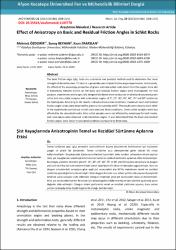Effect of anisotropy on basic and residual friction angles in schist rocks
Citation
Özdemir, M. , Beyhan, S. & Erarslan, K. (2023). Effect of Anisotropy on Basic and Residual Friction Angles in Schist Rocks . Afyon Kocatepe Üniversitesi Fen Ve Mühendislik Bilimleri Dergisi , 23 (1) , 208-215 . DOI: 10.35414/akufemubid.1149778Abstract
The basic friction angle (....) tests are a common and practical method used to determine the shear
strength of discontinuities. Tilt device is generally used in basic friction angle experiments. In this study,
the effects of the anisotropy properties of green and mica schist rocks taken from the copper mine site
in Kastamonu Hanönü district on the basic and residual friction angles were investigated. For this
purpose, experiments with a specially designed tilt device were conducted on dried and saturated green
schist and mica schist samples with orientation angles of 0°, 15°, 30°, 45°, 60°, 75° and 90° relative to
the loading axis. According to the results in dried and saturated conditions, maximum basic and residual
friction angle values were obtained for green schist samples at 60°. The results were close to each other
in the experiments carried out in both saturated and dried conditions. Green schist samples were less
affected by the saturated media. Mica schist samples were not affected by anisotropy for both media,
and close values were obtained in all orientation angles. It was determined that the basic and residual
friction angles were lower in saturated conditions compared to dried ones. Temel sürtünme açısı (....) deneyleri süreksizliklerin kayma dayanımının belirlenmesi için kullanılan yaygın ve pratik bir yöntemdir. Temel sürtünme açısı deneylerinde genel olarak tilt cihazı kullanılmaktadır. Bu çalışmada, Kastamonu Hanönü ilçesindeki bakır madeni sahasından alınan yeşil ve mika şist kayaçlarının anizotropi özelliklerinin temel ve rezidüel sürtünme açılarına etkisi incelenmiştir. Bu amaçla, yükleme eksenine göre 0°, 15°, 30°, 45°, 60°, 75° ve 90° yönelim açısına sahip kuru ve doygun yeşil şist ve mika şist numunelerine özel olarak tasarlanan tilt cihazı ile deneyler uygulanmıştır. Kuru ve doygun ortamlardaki sonuçlara göre yeşil şist numuneleri için 60°de maksimum temel ve rezidüel sürtünme açısı değerleri elde edilmiştir. Hem doygun hem de kuru ortam şartlarında yapılan deneylerde birbirine yakın sonuçlar elde edilmiştir. Doygun ortamdan yeşil şist numuneleri daha az etkilenmiştir. Mika şist numuneleri ise her iki ortam için anizotropiden etkilenmemiş ve tüm yönelim açılarında yakın değerler elde edilmiştir. Doygun ortam şartlarında temel ve rezidüel sürtünme açısının, kuru ortam şartlarına kıyasla daha düşük değerlerde olduğu belirlenmiştir.
Source
Afyon Kocatepe Üniversitesi Fen ve Mühendislik Bilimleri DergisiVolume
23Issue
1URI
https://doi.org/10.35414/akufemubid.1149778https://dergipark.org.tr/tr/download/article-file/2561249
https://hdl.handle.net/11630/11247
Collections
- Cilt 23 : Sayı 1 [25]



















